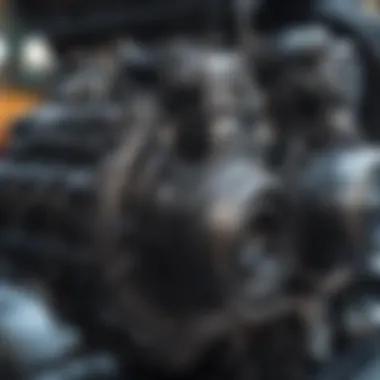Understanding the Role of a Ryder Diesel Technician


Intro
The profession of a Ryder Diesel Technician is critical in the transportation and logistics sectors. These technicians play an essential role in ensuring the efficient operation of diesel engines, which are commonly used in commercial trucks and heavy machinery. Understanding their responsibilities, skills, and the broader significance of their work is important for those considering a career in this field or those wanting to appreciate the intricacies of vehicle maintenance and repair services.
The Nature of the Work
Being a Ryder Diesel Technician involves accurately diagnosing mechanical issues and quickly resolving problems. This often requires a deep understanding of diesel engine mechanics and electrical systems. Their daily activities range from performing routine inspections to major repairs. Therefore, skills in both mechanics and electrical engineering become a key asset.
The significance of this role extends beyond just fixing problems. Diesel technicians are integral to maintaining the safety and reliability of vehicles and equipment. Reliable transportation is vital in logistics. Therefore, their work directly impacts businesses and industries that depend on the movement of goods.
To excel as a diesel technicians, one needs not only technical know-how but also problem-solving abilities and often a good dose of patience. They must be capable of interpreting complex diagnostic information and applying their knowledge efficiently. Furthermore, teamwork and communication skills come in handy in situations when collaboration with other professionals is required.
In summary, the life of a Ryder Diesel Technician is characterized by its demands for skill, attention to detail, and above all, a commitment to keeping some of the most important machinery in operation. With the continued growth of the transportation sector, the profession holds promising career prospects and challenges that are both stimulating and rewarding.
Prolusion to the Diesel Technician Profession
The profession of a diesel technician plays a crucial role in ensuring the efficiency and reliability of our transportation systems. In this section, we will explore the essence of being a Ryder Diesel Technician and highlight factors that define the position. With the growing reliance on diesel-powered vehicles across various industries, it's vital to understand how diesel technicians contribute to maintenance, repair, and overall vehicle performance.
Defining the Role
A Ryder Diesel Technician is primarily responsible for maintaining and repairing diesel engines and related mechanical systems. This encompasses routine inspections, diagnostics, and executing repairs using both manual and technical skills. These technicians work on a variety of diesel vehicles, including trucks, buses, and construction equipment, which gives them exposure to different subsystems.
As their technical expertise evolves, they use diagnostic equipment to evaluate performance levels and identify any issues that impact operations. Ultimately, this role requires not only mechanical skill but also a pronounced proficiency in understanding engine systems. Such diverse responsibilities make the technician invaluable in ensuring fleet safety and operational continuity.
Importance in the Transportation Industry
The transportation sector heavily relies on diesel engines due to their power and durability. Diesel technicians, like those at Ryder, directly influence fuel efficiency and minimize downtime of vehicles.
By ensuring that each vehicle is well-maintained and promptly repaired, technicians help high-demand sectors, like logistics and freight transport, run smoothly. Below are several points on why their role is substantial:
- Performance Optimization: Regular maintenance contributes to optimal performance, ensuring that vehicles operate under ideal conditions.
- Cost Efficiency: Effective repair strategies save companies money by preventing larger issues that could lead to expensive changes.
- Environmental Impact: Properly maintained diesel vehicles may produce lower emissions, contributing positively to environmental standards.
The vast implications of this job signify why it is not just a mechanical role, but one that sustains and propels industries forward. By grasping the foundational responsibilities of a Ryder Diesel Technician, we pave the way to appreciate other aspects of this profession in the following sections.
Core Responsibilities
The role of a Ryder Diesel Technician carries significant weight in the maintenance and operation of diesel vehicles. This section examines key responsibilities which not only showcase the complex nature of their work but also enhance the operational efficiency of the transportation systems they support.
Routine Maintenance Tasks
Routine maintenance is a cornerstone of the responsibilities undertaken by a Ryder Diesel Technician. This involves performing systematic checks, maintaining equipment, and ensuring that all components function smoothly. Regular oil changes, inspection of filters, and tire checks help in preventing major faults. Technicians must follow a strict schedule for servicing engines and auxiliary systems.
Furthermore, there is meticulous attention to detail required. Diesel engines operate under harsh conditions, which means that any amount of neglect may lead to serious problems. By catching small issues before they escalate, technicians save significant costs associated with vehicle downtime.
A good routine also includes the overall cleaning of vehicles and equipment, which impacts the longevity of these assets. Keeping components clean aids in better performance and efficiency. In essence, these tasks are more than just routine—they serve as the vital first line of defense against breakdowns that could disrupt transportation services.
Diagnostics and Troubleshooting
The ability to dissect and diagnose problems sets a Ryder Diesel Technician apart within the industry. They employ advanced diagnostic tools and systems to identify mechanical and electronic issues in diesel engines. This process demands a deep understanding of how various systems within an engine operate.


Troubleshooting involves a systematic approach. Technicians often begin with gathering information about the symptoms exhibited by the vehicle. They delve into component testing, voltage readings, and sometimes use software to gauge the performance of onboard systems. An accurate diagnosis can save time in treatment and reduce incidental damage. Efficient diagnostics correlate directly with reduced operational disruptions in the transportation industry.
In this context, the technician’s sharp analytical skills are indispensable. Detecting faults promptly ensures that vehicles remain not only functional but also compliant with regulatory standards.
Repair and Replacement Work
Once diagnostics highlight issues, the technician's role transitions to repair and replacement work. This phase often delves into a hands-on skillset where worker often disassembles components to replace worn-out or defective parts. Skills incorporating mechanical aptitude, knowledge of parts, and temp management come into play.
The level of precision required here cannot be overstated. Typically involved in this phase might be engine overhaul, replacing fuel systems, or exchanging critical parts like brakes and compressors. Each task must be executed with care to maintain safety and functionality standards.
Moreover, these endeavours require that technicians stay abreast of updates in tools and repair methodologies. This is necessary because as vehicles continually evolve, parts and processes also need to be current. A job well done here reinforces the reliability of the diesel systems in service.
As such, the responsibilities mentioned encapsulate the role of a Ryder Diesel Technician and lay the groundwork for both their individual success and that of the broader transportation network.
Educational Requirements
The educational requirements for a Ryder Diesel Technician are key to understanding how individuals prepare for a career in this field. Various facets make this aspect crucial, from grasping foundational knowledge to understanding specialized techniques that ensure optimal performance from diesel systems. The route can be intricate, but having a clear education plan is beneficial.
Essential Skills and Qualifications
A Ryder Diesel Technician must acquire a specific set of skills and qualifications that cater to the demands of the job. First, a high school diploma or equivalent is usually required. However, many employers prefer technicians with an associate degree in diesel technology from an accredited institution. This education typically covers both diesel engine systems and the related components.
It is essential for these technicians to be proficient in mechanical and electronic systems. This requirement arises because modern diesel engines are complex and integrate advanced technologies such as electronic fuel injection and computer-controlled diagnostics.
In addition to education, personal proficiencies such as attention to detail, problem-solving skills, and mechanical aptitude play significant roles in a technician's success. They must systematically assess problems and come up with effective solutions.
"A solid educational background is a good foundation, but continuous learning helps keep skills sharp and relevant."
Some basic skills include but are not limited to:
- Understanding of hydraulic systems
- Familiarity with automotive electronics
- Competence in using diagnostic tools
Nurturing these abilities can help a technician excel and undertake various service tasks efficiently.
Training Programs and Certifications
Completing formal training programs is a significant component of the educational journey. These programs assist aspiring diesel technicians in gaining practical experience in real-world scenarios, further reinforcing theoretical knowledge. Educational institutions often partner with companies to offer internships or apprenticeships, allowing students to apply their skills in actual working environments.
Certain recognized certifications also provide a competitive edge in the job market. Organizations like the National Institute for Automotive Service Excellence (ASE) offer certification in diesel engines. Achieving such credentials demonstrates a technician's competency and commitment to quality work.
Additional training might involve:
- Emission certifications
- Manufacturer-specific courses (like Cummins or Detroit Diesel)
- Safety training related to workplace regulations and hazardous materials
These elements not only strengthen their mechanical skills but also prepare them to manage uncertainties involved in working with heavy machinery and complex systems. Enrollments in specialized programs centered on the latest technologies, such as alternative fuels and eco-friendly engines, can also enhance qualifications, catering to evolving market needs.
Ultimately, understanding the educational requirements enables new technicians to structure their career paths effectively, setting them on a course to success in the competitive landscape of diesel vehicle maintenance.
Technological Proficiencies


The field of diesel mechanics is continually evolving, much like the engines and vehicles that technicians work on. For a Ryder Diesel Technician, proficiency in various technologies is paramount. It aids efficiency, accuracy, and the ability to quickly troubleshoot complex issues. Additionally, technological proficiencies are vital not only for daily operations but also for keeping pace with industry advancements.
Tools Commonly Used
Ryder Diesel Technicians depend on several key tools to perform maintenance and repairs. These tools not only ensure the precision required for diesel engines but also enhance productivity.
Some of the most commonly used tools include:
- Diagnostic Scanners: These devices read fault codes from the engine's computer, helping technicians pinpoint issues quickly and accurately.
- Wrenches and Sockets: A variety of sizes are crucial for loosening and tightening bolts of varying dimensions. Ratchet sets, including standard and metric, are essentials in any technician's toolbox.
- Multimeters: These are used to check the electrical systems of vehicles. Accurate readings are key to diagnosing electrical faults.
- Torque Wrenches: These tools permit technicians to ensure parts are fastened to the manufacturer’s specifications, which can prevent future problems.
Using the right tools minimizes mistakes and helps complete jobs promptly to meet industry time requirements.
Emerging Technologies in Diesel Mechanics
As diesel technology undergoes intensive research and innovation, understanding emerging technologies is not only an advantage for technicians but often a necessity. Hybrid and electric technology, advanced emissions systems, and computerized engine controls can transform the role of a Ryder Diesel Technician.
A few significant trends in emerging technologies include:
- Telematics Systems: This technology allows for real-time monitoring of vehicle performance. It helps technicians assess the health of the engine remotely, enabling proactive maintenance.
- 3D Printing: Some parts can now be produced in-house which reduces wait times for parts ordered. This could yield greater efficiency in repairs and consequent customer satisfaction.
- Advanced Diagnostic Tools: Technologies that include artificial intelligence provide insight into predictive maintenance, allowing technicians to anticipate problems even before they manifest.
Incorporating these emerging technologies into daily tasks can enhance overall outcomes. This results in more efficient service and improves the customers' trust in the expertise offered by Ryder Diesel Technicians.
Staying ahead in technology is not merely advantageous; it’s crucial for adapting to the future needs of the transportation industry.
Work Environment
The work environment for a Ryder Diesel Technician is instrumental in shaping the overall effectiveness and efficiency of their operations. Various aspects impact daily actions and long-term career growth. Understanding these elements can facilitate improved practices and better outcomes for both technicians and their customers.
Typical Job Settings
A Ryder Diesel Technician typically operates in various work settings. These primarily include:
- Maintenance Facilities: Technicians work at specialized facilities equipped with tools and equipment necessary for heavy-duty diesel repairs and maintenance. These locations often serve a fleet of vehicles, ensuring timely service.
- Field Operations: Sometimes, technicians conduct on-site repairs, helping reduce vehicle downtime. This aspect exposes them to different environments, enhancing their adaptability.
- Transportation Hubs: Given Ryder's extensive logistics services, technicians might work near transportation hubs, doing inspections and repairs to ensure that vehicles meet safety and performance standards.
In every arrangement, work conditions can vary significantly. Variability in workload, machine access, and the wider organizational culture can all affect a technician's daily routine and job satisfaction.
Collaboration with Other Professionals
Collaboration is essential in any profession, and for Ryder Diesel Technicians, this is no different. Specifically, technicians often work alongside various professionals to achieve optimal results.
- Fleet Managers: Technicians regularly interact with fleet managers to identify vehicle issues, discuss repairs, and evaluate overall fleet performance metrics. Effective communication ensures timely recommendations and fleet assessments.
- Parts Suppliers: Securing the right parts promptly is crucial in maintaining productivity. Collaboration with parts suppliers helps in rebuilding relationships and obtaining necessary components in effective timelines.
- Safety Inspectors: Regular communication with safety inspectors helps ensure compliance with safety regulations. Technicians must follow established norms to protect their wellbeing and that of their colleagues.
A cohesive work atmosphere can greatly aid in problem-solving and increase job efficiency, showcasing the depths of each technician’s role within the company.
Engaging with colleagues across these various roles not only fosters professional networking, but also encourages continuous learning in maintenance techniques and technologies.
Career Prospects and Advancement
The field of diesel technology presents ample opportunities for skilled technicians, especially those in the Ryder Diesel Technician role. Navigating the intricacies of this profession not only requires technical proficiency but also opens doors to growth and development. There is staunch demand for professionals in this arena due to increased reliance on diesel-powered vehicles across various sectors, making this a career worth pursuing.


Job Market Trends
Considering the current landscape, the job market for diesel technicians is growwing substantially. The Bureau of Labor Statistics indicates that job growth in this sector is projected to be 8% from 2020 to 2030, which is faster than the average for all occupations. As transportation companies expand their fleets, the need for qualified technicians will likely surmount.
A few notable trends are:
- Increased Adoption of Clean Diesel Technology: With environmental concerns growing, many companies invest in clean diesel technologies. This creates demand for technicians who have knowledge of these systems.
- Growth in E-commerce: The expansion of e-commerce results in a need for more delivery vehicles. This directly impacts diesel technicians, making their role increasingly vital.
- Retirement Rates of Current Technicians: An aging workforce causes many seasoned technicians to retire. Their departure leaves vacancies that ambitious new technicians can fill.
The demand for diesel technicians is a notable phenomenon, and staying informed about these trends is essential.
Opportunities for Advancement
There exists a variety of pathways to advance within the diesel technician profession. Opportunities vary based on experience, skills, and further education. Important aspects regarding career advancement include:
- Specialization: Technicians can decide to specialize in certain areas, such as marine diesel, heavy equipment, or alternative fuel technologies. Specialization leads to higher earning potential.
- Certifications: Pursuing certifications improves prospects significantly. Obtaining credentials, like those from the National Institute for Automotive Service Excellence (ASE), can validate a technician's skills and elevate their employability.
- Leadership Roles: With experience, technicians may move into leadership or supervisory roles. These positions often come with greater responsibility and incentives.
As the industry continues developing, fueled by technological advancements and shifting market needs, the prospects for growth and fulfillment in this career remain front and center. Ultimately, a commitment to lifelong learning and adaptability is crucial for anyone pursuing this profession.
The role of a Ryder Diesel Technician is not merely about maintaining vehicles; it's about contributing to safer roads and efficient transportation solutions.
Challenges in the Field
The role of a Ryder Diesel Technician is often overlooked. The challenges faced are crucial for understanding this profession. These challenges have a significant impact on daily operations and long-term career sustainability. As the industry evolves, technicians must adapt to new conditions, addressing skill demands and emerging trends.
Common Issues Faced
Ryder Diesel Technicians encounter various practical challenges in their work environment. Among the most common issues are:
- Equipment Durability: Diesel machinery can often be unreliable, and technicians might be called to fix emergency breakdowns. This reality can lead to stressful nights and weekends, dealing with unexpected calls.
- Parts Availability: Sourcing specialized parts can pose a significant delay in repair work, particularly if the part needed is rare or obsolete. Quick turnaround is vital for efficiency.
- Technical Complexity: Engines and systems have become increasingly sophisticated. Technicians must continually update their knowledge to keep pace with advancements in vehicle technology.
- Workplace Safety: Diesel technicians are exposed to hazardous materials, requiring strict adherence to safety protocols. Negligence might lead to accidents, affecting morale and productivity.
Each of these challenges can influence performance, underscoring the importance of this profession. Reactive rather than proactive approaches can hinder success.
Impact of Industry Changes
The diesel technology landscape is changing. These shifts present both obstacles and opportunities for technicians. Key impacts include:
- Innovation in Tech: Advances in technology require technicians to enhance their educational background, constantly absorbing fresh information to remain competent. This needs an investment of time and resources.
- Environmental Regulations: As diesel engines are scrutinized for emissions, technicians must sustain compliance with new standards. This impact demands extensive knowledge regarding eco-friendliness while keeping performance intact.
- Economic Factors: Fluctuations in fuel prices affect the operational demand for technicians. Economic security can waver, influencing job stability.
- Consumer Expectations: Customers now expect immediate and transparent service. Diesel technicians must navigate this demand with both technical skills and effective communication.
Overall, both common issues and impact from industry changes play a vital role in shaping the trajectory of a Ryder Diesel Technician's career. Addressing challenges not only improves skill levels but also enriches the understanding of their ultimate contribution to the field.
Epilogue
In summarizing the integral aspects surrounding the role of a Ryder Diesel Technician, it becomes clear how critical this profession is within the broader context of the transportation and logistics sector. These technicians not only ensure vehicle functionality but also uphold safety standards which are paramount in such an industry.
Summary of Key Points
- Diesel technicians engage in detailed diagnostic processes and repairs. They are skilled in routine maintenance tasks that prevent major breakdowns.
- Educational pathways to this profession generally include apprenticeships and industry-specific certifications, which narrow down essential skills like problem-solving and analytical thinking.
- Furthermore, emerging technologies are changing how diesel technicians perform their duties, emphasizing the need for constant education and adaptability.
- Career prospects are favorable, with increasing demand for skilled technicians alongside advancements in diesel technology and eco-friendly initiatives influencing the job landscape.
The combination of practical skills, advanced technology, and continuous learning creates a dynamic career environment for Ryder Diesel Technicians.
Final Thoughts on Future Prospects
In looking ahead, the landscape for Ryder Diesel Technicians appears to be evolving positively. Technicians will find themselves not just as repairmen but as integral parts of an ecosystem increasingly reliant on technological innovations. The industry's shift towards alternative fuels and smart technologies proposes new challenges and opportunities for skill development.
As maintenance becomes more complex with the integration of artificial intelligence and data analytics in vehicles, continuing education will become crucial. This emphasis on evolving skill sets not only benefits individual career advancement but also contributes significantly to the overall efficiency and sustainability of the transportation sector.







